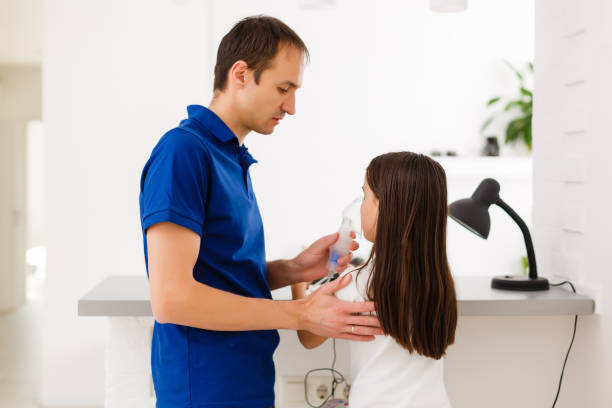Ayurvedic Treatment For Childhood Asthma
In the realm of childhood ailments, asthma stands out as a common yet challenging condition affecting millions worldwide. Characterized by recurrent episodes of wheezing, coughing, chest tightness, and shortness of breath, childhood asthma poses significant hurdles to the well-being and daily activities of affected children. While conventional treatments provide relief, many parents seek complementary approaches that offer holistic management with fewer side effects. Enter Ayurveda, an ancient Indian system of medicine that emphasizes balance and harmony within the body, mind, and spirit. In this comprehensive guide, we delve into the principles, therapies, and remedies of Ayurvedic Treatment For Childhood Asthma in Delhi, exploring its potential to alleviate symptoms and promote long-term wellness.
Understanding Childhood Asthma in Ayurveda
In Ayurveda, childhood asthma is often understood through the lens of ‘Pranavaha Srotas,’ the respiratory system channel responsible for the intake of vital energy (prana). According to Ayurvedic principles, childhood asthma results from an imbalance in the doshas, particularly Vata and Kapha. Vata imbalance disrupts the flow of air, causing constriction and spasms in the bronchial tubes, while Kapha aggravation leads to excess mucus production, obstructing the airways and triggering inflammation.
Holistic Approaches to Asthma Management
Ayurvedic treatment for childhood asthma adopts a multifaceted approach that addresses the root causes of the condition while nurturing overall health and vitality. Key components of Ayurvedic management include:
- Dietary Modifications: A balanced and wholesome diet plays a pivotal role in managing childhood asthma. Ayurveda recommends incorporating warm, light, and easily digestible foods while avoiding cold, heavy, and mucus-forming substances. Emphasizing fresh fruits, vegetables, whole grains, and herbal teas can help pacify aggravated doshas and promote respiratory health.
- Herbal Remedies: Ayurvedic herbs have long been revered for their therapeutic properties in managing respiratory disorders. Common herbs like Tulsi (Holy Basil), Vasaka (Malabar Nut), and Adhatoda (Adulsa) are renowned for their bronchodilator, expectorant, and anti-inflammatory effects, helping to ease breathing difficulties and reduce airway inflammation in children with asthma.
- Lifestyle Modifications: In Ayurveda, lifestyle practices profoundly influence health outcomes. Encouraging children to engage in regular physical activity, practice deep breathing exercises (Pranayama), and maintain a consistent sleep schedule can enhance lung function, strengthen immunity, and mitigate the severity of asthma symptoms.
- Yoga and Pranayama: The integration of yoga and Pranayama (breath control techniques) offers profound benefits in managing childhood asthma. Gentle yoga postures and breathing exercises help expand the lungs, improve respiratory muscle strength, and enhance overall lung capacity, fostering greater resilience against asthma triggers and exacerbations.
- Aromatherapy and Essential Oils: Inhalation therapy with therapeutic-grade essential oils such as Eucalyptus, Peppermint, and Frankincense can provide immediate relief from asthma symptoms by opening up the airways, reducing congestion, and promoting relaxation. Diluting essential oils in carrier oils or using them in diffusers creates a soothing and supportive atmosphere conducive to respiratory wellness.
Ayurvedic Treatment Protocols
In Ayurveda, the treatment of childhood asthma is tailored to the individual constitution (Prakriti) and specific imbalances present in each child. Ayurvedic practitioners conduct a thorough assessment of the child’s doshic profile, medical history, and current symptoms to devise a personalized treatment plan that addresses the underlying root causes of asthma while restoring equilibrium to the body and mind.
Ayurvedic therapies commonly employed in the management of childhood asthma include:
- Swedana (Herbal Steam Therapy): Utilizing steam infused with medicinal herbs to induce sweating, eliminate toxins, and alleviate respiratory congestion.
- Nasya (Nasal Administration): Instilling medicated oils or herbal preparations into the nasal passages to clear sinus congestion, reduce inflammation, and enhance respiratory function.
- Abhyanga (Therapeutic Massage): Gentle massage with warm herbal oils promotes relaxation, improves circulation, and supports the release of muscular tension, easing breathing difficulties associated with asthma.
- Panchakarma Detoxification: Comprehensive detoxification protocols like Vamana (Therapeutic Emesis) and Virechana (Purgation Therapy) help remove deep-seated toxins, pacify aggravated doshas, and rejuvenate the respiratory system.
Integrating Ayurveda with Conventional Care
While Ayurveda offers valuable insights and therapeutic modalities for managing childhood asthma, it is essential to approach treatment holistically and integrate Ayurvedic principles with conventional medical care. Collaborating with pediatricians, pulmonologists, and Ayurvedic practitioners ensures comprehensive evaluation, monitoring, and management of asthma symptoms, optimizing outcomes and promoting the overall well-being of the child.
Thank you for exploring our comprehensive guide on Ayurvedic Treatment for Childhood Asthma. We hope you found valuable insights and information to support your journey towards holistic health. If you have any questions, or concerns, or would like to share your experiences, please feel free to reach out to us. Your feedback is important to us as we strive to provide accurate, informative, and helpful content.
Contact Ayurvedic Opinion at +91 9911203036 to schedule your Online Ayurvedic Doctor Consultation and discover the path to optimal health. Your well-being is our priority.
We appreciate your interest and look forward to hearing from you. Your health and well-being matter, and we’re here to support you on your journey to a healthier and happier life.

